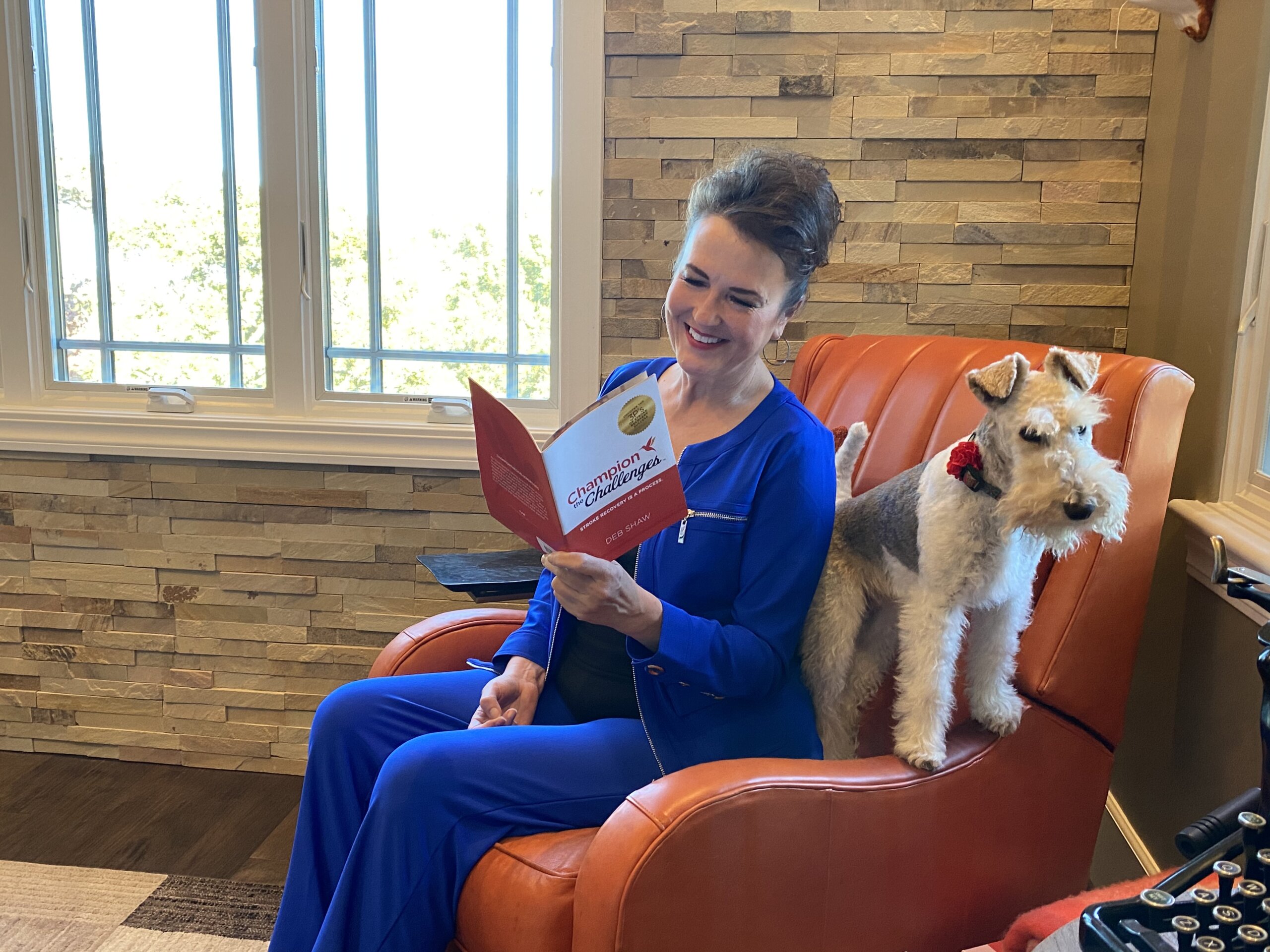
I recently went one on one with Deb Shaw, CEO of the nonprofit Champion the Challenges.
Adam: Thanks again for taking the time to share your advice. First things first, though, I am sure readers would love to learn more about you. How did you get here? What experiences, failures, setbacks or challenges have been most instrumental to your growth?
Deb: As a three-time stroke survivor (occurring during 2016-2019), it seems like the second half of my life has been focused on the medical and rehabilitation world, over-shadowing my earlier technology career.
I grew up in Ohio and Florida and spent most of my career in California’s Silicon Valley in the technology and IT networking space. This provided the opportunity for me to work with a diverse set of global cultures and teams. I learned a lot about building a customer service team, working with many of the largest global businesses as the Head of Global Customer Service. My husband, Bob of 34 years, and our two wire hair fox terriers make our home special and bring joy every day.
After the strokes, I was in a very new world that was scary, big, and frustrating, not to mention very fragmented. I quickly became immersed in the world of medical rehabilitation. I made many amazing discoveries. Determining there was a big need to reimagine the way rehabilitation is conducted in the world, my focus started on stroke rehabilitation to show success.
The beginning was research, reviewing what was working along with areas of improvement within the healthcare and rehabilitation system. I spoke with doctors, therapists, caregivers, spouses and technology companies inventing products for stroke survivors. I then reviewed over 30 rehabilitation websites, purchased, and read 20-plus stroke related books, and looked at existing nonprofits in the world of stroke. Additionally, part of rehabilitation included every type of stroke therapy I could find, investing 4-5 hours a day, 6 days a week using them. These included such experiences as healthcare virtual reality (VR), cranial-acupuncture, quantum neurology, water therapy, hyperbaric oxygen therapy (HBOT), acupressure therapy, traditional OT and PT. The bottom-line is, I determined that there are a great set of therapies available. Yet, there was a big disconnect as most stroke survivors, therapists, families, and caregivers didn’t know all of these therapies were available, and while not for everyone, they should be aware of them and then determine if they are a fit or not.
Adam: What are the best leadership lessons you have learned from leading a non-profit organization?
Deb:
-
Stay laser beam focused on the vision and purpose that is driving your reason for existing. Many things happen each day, week, and month but nothing is more important than servicing your audience or those you created the nonprofit to help.
-
Change what isn’t working fast and learn from it.
-
Smile and be fun to be around, it is the best way to attract the best things life has to offer.
Adam: What are your best tips for fellow leaders of non-profit organizations?
Deb: 1. Relentless passion is necessary: like everything great in life and in the world, it doesn’t always come easy, and a nonprofit is no exception. When things get difficult or tough, you need to have relentless passion to drive forward, so nothing gets in your way or causes you to consider changing your mind. For example, just getting the nonprofit 501(c)3 approval can take 6-12 months and the paperwork and details that are necessary requires a clear focus and insight.
2. It’s a start-up, plain and simple, you are starting a business. Other than the fact it is a nonprofit, everything else is exactly the same. You need some seed money to get going. You have to be resourceful, creative, team-oriented and entrepreneurial to build your dream and keep it going and growing.
3. Build a brand: you can have the greatest ideas and intentions in the world, but if you can’t market it and build momentum, it makes it hard to achieve your goals and desires.
4. Build it right, right from the start: have a vision 3 years out and think about the software, tools, website and team you will need to grow and expand. Take the time to research the newest approaches and study the nonprofits that are growing the fastest and learn what they are doing. I selected a CRM, donation engine and website platform that would expand and scale as we grow. It needed to be easily updated and always look current and professional.
5. Think big, different and ask for help: you will sometimes be surprised how willing people will be in helping you succeed if you paint a big picture of where you are going and ask them to help. Sometimes life just comes down to asking for what you want. I have been building a team of experts and industry leaders as company advisors and friends who want to see my nonprofit positively impact the world of stroke.
6. Create content that your customers or audience can use every day. I really want to make sure that every time stroke survivors come to the website or refer someone else that they say, “wow, there is really a lot of very useful content I can use right now.” One of the very popular areas of interest is the quick read booklets, that I created. They are digital and apply to everyone that needs some inspiration, a pick-me-up, or a fresh set of ideas on how to get unstuck.
 Adam: What advice do you have on how to lead effectively during times of crisis?
Adam: What advice do you have on how to lead effectively during times of crisis?
Deb: Refresh yourself and the team on the Vision, Mission, and Strategy to be sure they are clear on the goals and objectives of the organization, sort of a re-grounding. Then have an open and honest discussion on how you need to modify your course, speed and tactics given the current conditions and environment. I have found that you also need to be crystal clear, very often where you’re going each month and quarter to stay aimed in the right direction. Finally, celebrate wins and successes no matter how small. This keeps the team positive and feeling motivated. It will also help create positive stories they can share with their families.
Adam: In your experience, what are the defining qualities of an effective leader? How can leaders and aspiring leaders take their leadership skills to the next level?
Deb: Leaders must inspire and motivate a team of people to passionately work toward a common goal. As a leader, you need to balance the skill sets or hats you wear to keep the team engaged and passionate depending on what they need at the time. I have found that having a balance between being a coach, cheerleader, mentor, and teacher can help the team achieve their goals. The best outcomes are achieved when the team can say “look what we accomplished!” You can smile and thank them as their leader.
Your leadership skills are always evolving. I have found reading biographies and studying many different leaders throughout history has helped me draw from the lessons learned in the past.
Adam: What are your three best tips applicable to entrepreneurs, executives and civic leaders?
Deb:
-
Crystal clear accountability and responsibilities for each team member. This binds the team together and builds esprit de corps eliminating any confusion on who is doing what.
-
A repeatable mission and strategy the team clearly understands and can share with employees, customers and the media on a regular basis.
-
Create a 5-6 person mastermind group to collaborate with other leaders, enabling you to check your logic and brainstorm on new ideas in fun and inspiring locations.
Adam: What is your best advice on building, leading and managing teams?
Deb: Listen and ask your team what they are excited about and concerned about. Spend time with your team and customers together, living life from time to time in the customers world so your product or service is always in everyone’s mind and state of being. I often have found that by being able to tell a story to emphasize a point to your team enables them to get it and really learn, as opposed to just being told to do something.
Adam: What is the single best piece of advice you have ever received?
Deb: Whatever you do, do it with passion or don’t do it at all.
Adam: What should everyone do to pay it forward?
Deb: Our free online and printed booklets are created from the best ideas that we can uncover from stroke survivors, families, and therapists. They are made available to any stroke survivor in the world free of charge to inspire them to move forward and champion the challenges that are a part of a successful rehabilitation journey.
Adam Mendler is the CEO of The Veloz Group, where he co-founded and oversees ventures across a wide variety of industries. Adam is also the creator and host of the business and leadership podcast Thirty Minute Mentors, where he goes one on one with America’s most successful people – Fortune 500 CEOs, founders of household name companies, Hall of Fame and Olympic gold medal winning athletes, political and military leaders – for intimate half-hour conversations each week. Adam has written extensively on leadership, management, entrepreneurship, marketing and sales, having authored over 70 articles published in major media outlets including Forbes, Inc. and HuffPost, and has conducted more than 500 one on one interviews with America’s top leaders through his collective media projects. A top leadership speaker, Adam draws upon his insights building and leading businesses and interviewing hundreds of America’s top leaders as a top keynote speaker to businesses, universities and non-profit organizations.
Original article can be read at: https://www.adammendler.com/blog/deb-shaw
